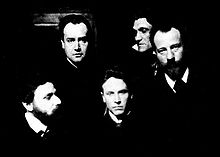- Munich Cosmic Circle
-
The Munich Cosmic Circle was a group of writers and intellectuals in Munich, Germany at the turn of the 20th century, based around the mystic Alfred Schuler.[1] Along with Schuler, it consisted of the philosopher Ludwig Klages (1872-1956), the poet Karl Wolfskehl (1869-1948) and the writer Ludwig Derleth (1870-1948).[2] Another member of the group was the "Bohemian Countess" of Schwabing, Fanny zu Reventlow (1871-1918). She wrote about her experiences with the group in her Roman à clef Herrn Dames Aufzeichnungen (1913).[3]
Alfred Schuler and Ludwig Klages came to know each other in 1893. With the others they based their early association upon an appreciation of Ibsen's dramas.[4] Another interest was the work of Johann Jakob Bachofen (1815-1887), a Swiss anthropologist and sociologist, and his research into matriarchal clans.[5] They developed a doctrine according to which the West was plagued by downfall and degeneration, caused by the rationalizing and demythologizing effects of Christianity. A way out of this desolate state could, according to the "Cosmic" view, only be found by a return to pagan origins. Schuler was described by Theodor Lessing as "an oddity, a curious mixture of charlatan and genius, a show-off and a visionary".[6] The activities and rituals of the group were often sensationalized in bohemian fin-de-siecle Schwabing.
Some members of the Circle were also active in the group around the poet Stefan George, whom Wolfskehl introduced to the group. Ludwig Klages wrote a book praising his poetry in 1902.[7] George was not a member of the Circle, though he was in close contact with them.[8]
The group fell apart through an acrimonious dispute in 1904 between Klages, who considered himself a neo-pagan and against any form of organized religion, and the Zionist Wolfskehl, which led to charges of anti-semitism against Klages. Stefan George had also begun to distance himself from Klages' philosophy at this time and defended Wolfskehl against Schuler and Klages.[9]
Notes
- ^ The Jung Cult: Origins of a Charismatic Movement, By Richard Noll, p. 166-172.; Germany at the fin de siècle: culture, politics, and ideas, By Suzanne L. Marchand, David F. Lindenfeld
- ^ Where D.H. Lawrence was wrong about woman by Holbrook, David. Bucknell University Press, Associated University Presses, 1992
- ^ Gunna Wendt: Franziska zur Reventlow. Die anmutige Rebellin. Berlin 2008 (German)
- ^ Julia Zernack: "Nordische Mythen in der deutschen Literatur. Eddaspuren bei George und Wolfskehl", in: Annette Simonis (Hg.): Intermedialität und Kulturaustausch: Beobachtungen im Spannungsfeld von Künsten und Medien, Bielefeld: transcript Verlag, 2009, S. 38. (German)
- ^ The Myth of Matriarchal Prehistory, Cynthia Eller, esp. p. 33-34.
- ^ Lessing, Theodore, Einmal und Nie Wieder. Bertelsmann, Guetersloh. 1969 (German)
- ^ Secret Germany: Stefan George and his circle by Robert Edward Norton
- ^ Georg Dörr: Muttermythos und Herrschaftsmythos, S.188 (German)
- ^ Furness, Raymond. Zarathustra's children: a study of a lost generation of German writers, p. 95
Categories:- Munich culture
- German philosophy
- German writers
- German poets
- German poetry
Wikimedia Foundation. 2010.

